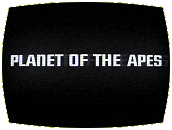 Virdon, Burke and Galen find the ruins of a city – once known to them as Oakland – and find it inhabited by humans, though the approach of an ape patrol on horseback is enough to scatter anyone who might welcome the travelers. They take refuge in a building that was once the Oakland Science Institute – a place that Virdon remembers as a government think tank – where they discover a piece of equipment locked away for centuries, intact and functional: a hologram promising the sum total of human knowledge at the time of the then-approaching apocalypse. It needs a new battery before it will divulge any of that knowledge, however, and Virdon becomes nearly obsessed with constructing a new battery; even just before his capture, he tells Burke that extracting the information is more important than the lives of any one of the group. Virdon is captured by Urko’s troops, but while Urko is eager to torture his prisoner, Dr. Zaius arrives to conduct the interrogation by far subtler means. Virdon may not even realize that he is betraying his fellow fugitives…or that he’s handing over the sum of human knowledge to the apes.
Virdon, Burke and Galen find the ruins of a city – once known to them as Oakland – and find it inhabited by humans, though the approach of an ape patrol on horseback is enough to scatter anyone who might welcome the travelers. They take refuge in a building that was once the Oakland Science Institute – a place that Virdon remembers as a government think tank – where they discover a piece of equipment locked away for centuries, intact and functional: a hologram promising the sum total of human knowledge at the time of the then-approaching apocalypse. It needs a new battery before it will divulge any of that knowledge, however, and Virdon becomes nearly obsessed with constructing a new battery; even just before his capture, he tells Burke that extracting the information is more important than the lives of any one of the group. Virdon is captured by Urko’s troops, but while Urko is eager to torture his prisoner, Dr. Zaius arrives to conduct the interrogation by far subtler means. Virdon may not even realize that he is betraying his fellow fugitives…or that he’s handing over the sum of human knowledge to the apes.
written by Robert Hamner
directed by Bernard McEveety
music by Earle HagenGuest Cast: Zina Bethune (Arn), Jackie Earle Haley (Kraik), Robert Phillips (Gorilla Captain), Mark Lenard (Urko), Booth Colman (Zaius), Jon Lormer (Scientist), Wayne Foster (Gorilla Sergeant), Victor Kilian (Human)
Notes: Director Bernard McEveety (1924-2004) was the brother of Star Trek director Victor McEveety, whose six turns in the director’s chair on that series included some of its more memorable episodes; both brothers also directed episodes of Buck Rogers. Bernard McEveety’s other genre credits include episodes of Airwolf, Blue Thunder, Voyagers!, The Incredible Hulk, and Knight Rider, but he may be best remembered as the director of the miniseries How The West Was Won. The city ruins seen in The Legacy look remarkably like those seen in The Trap, aired mere weeks earlier.
LogBook entry by Earl Green
